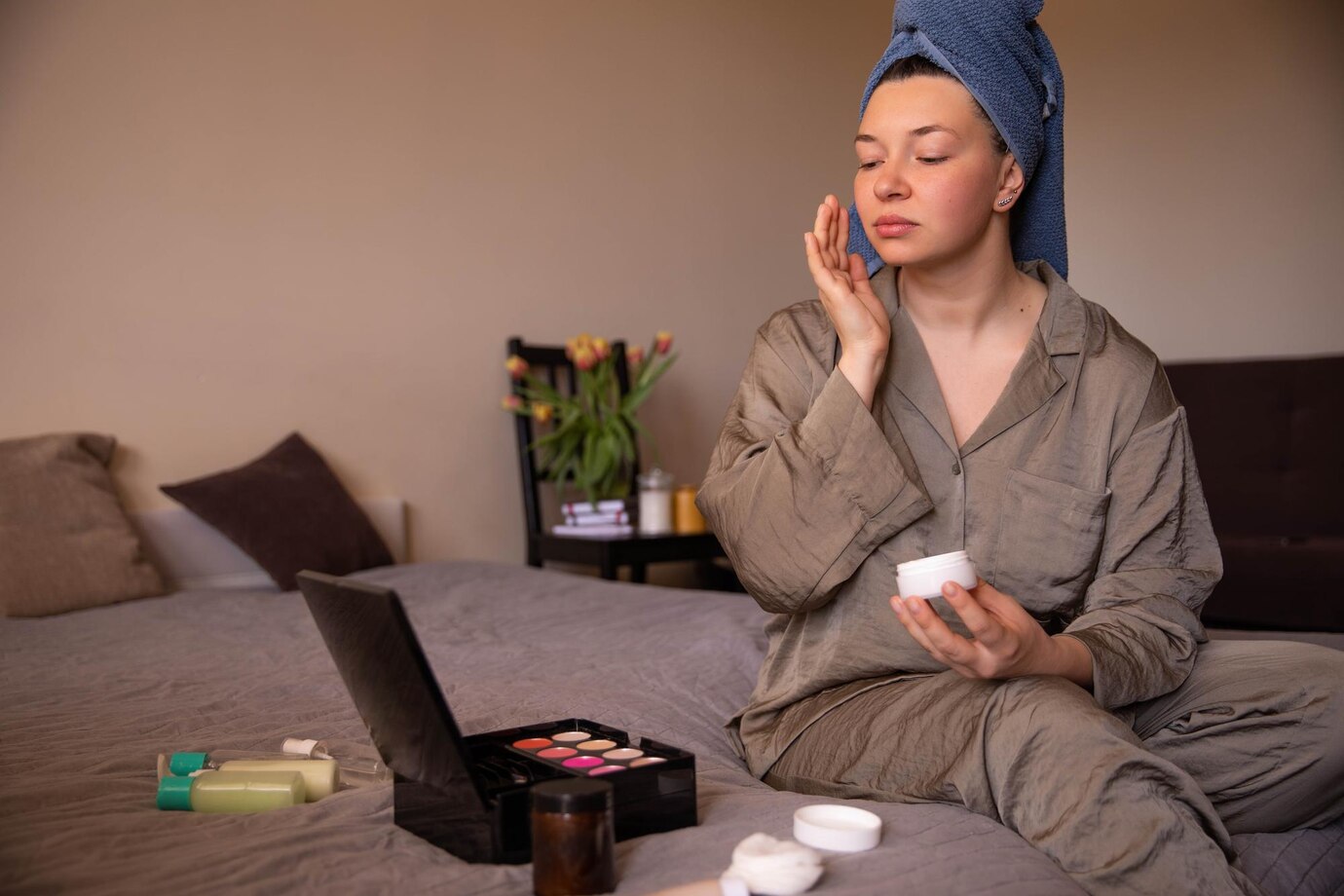Most of us are concerned about our skin care and try different products to hide aging signs. Skincare products are go-to source to treat these problems but there’s a debate that these growth factors in these products can cause cancer. However, it’s clear from researches that growth factors don’t contribute to cancer.
Two scientists discovered growth factors in 1950 and differentiated that how nerve growth factor (NGF) and epidermal growth factor (EGF) contribute to skin’s regulation.
These are usually present in masks, moisturizers, natural bar soaps, and growth factor serums. Although, there’s no evidence that these growth factors cause cancer. They just mimick the growth factors which are naturally present in our body and help in healing and maintaining the skin. Let’s see what these growth factors do and whether they are safe for your skin.
What Are Growth Factors In Skin Care?
Growth factors are proteins that are present in our body. They act as messengers instructing cells what to do. Over the last three decades, many cosmetics have mimicked these growth factors when used on your skin.
They are also responsible for healing wounds and repairing blood vessels. Various cell types secrete growth factors in the epidermis and dermis. These include keratinocytes, fibroblasts, and melanocytes.
As we old, our bodies produce growth factors in less amount. So, adding the best growth factors for your skin can be good for your health.
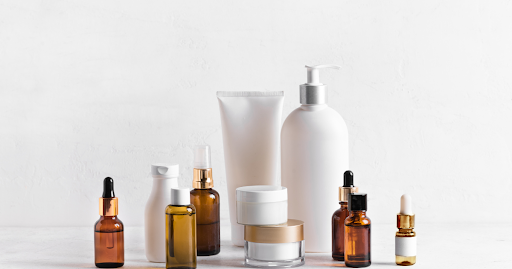
Can Growth Factors in Skin Care Cause Cancer?
Using growth factors in skin care products raises the question of whether these ingredients can cause cancer. A great deal of research and debate has been conducted on this topic.
Cancer arises when cells start to grow uncontrollably. Usually, cells grow and die in an orderly fashion. Cancer disrupts this process, causing cells to grow and divide uncontrollably. This process results in forming tumours.
These tumours can be benign or malignant. Malignant tumours destroy nearby cells and can spread to other body parts. It is known as metastasis.
What Is the Connection Between Growth Factors and Cancer?
In skincare, growth factors play a role in promoting collagen production. It helps to improve skin texture and accelerate healing. However, the idea that these proteins might also encourage cancerous growth is worth examining.
Dr. Vivian Bucay researched it after being diagnosed with stage-four melanoma. She emphasises that a balanced solution of growth factors in skin care products does not increase cancer risk.
The paramount reassurance comes from the fact that growth factors are large molecules. Due to their large size, they cannot get deeply into the skin.
It means they do not reach the bloodstream or interact with deeper cellular structures where they could potentially cause harm. This was a crucial point which ultimately failed to prove a direct link between these products and cancer.
Experts like Dr. Zoe Diana Draelos also highlight that growth factors are controversial. Their sizeable molecular size limits their ability to penetrate the skin’s outer layer, the stratum corneum. These growth factors primarily interact with surface cells. So, there’s no risk of promoting cancerous growth internally.
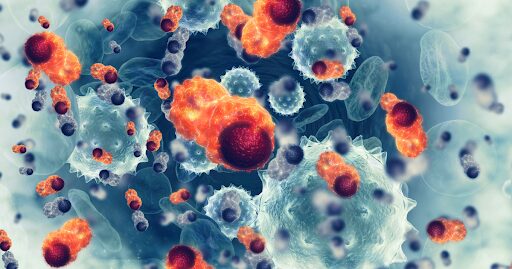
How do Growth Factors Work in the Skin?
Growth factors are proteins secreted by various cells in the body. These also include fibroblasts and keratinocytes. Yet, their large size prevents them from penetrating the skin. So they can trigger a surface-level chain reaction. This reaction communicates messages to deeper layers. It encourages rejuvenation and repair processes.
Interaction with Skin Cells
Fibroblasts and keratinocytes are two critical elements in the skin. Fibroblasts produce collagen, which keeps skin smooth. When they bind to fibroblast receptors, they stimulate cells to increase collagen production.
While Keratinocytes are the cell type in the epidermis, they respond to growth factors by promoting overall skin health. Skincare growth factors have distinct roles, like Fibroblast Growth Factor (FGF) and epidermal Growth Factor (EGF).
FGF and PDGF are involved in the formation of new blood vessels. This process is known as angiogenesis and plays a vital role in tissue repair. On the other hand, EGF helps in the rapid turnover of skin cells.
Role in Wound Healing and Tissue Repair
One of the most critical functions of growth factors is their role in wound healing. When your skin gets injured, growth factors increase collagen and elastin production. These are crucial for maintaining skin elasticity.
Growth factors also regulate the activity of genes involved in cell proliferation. This ability to promote cellular turnover and repair makes growth factors invaluable. So, they help reduce wrinkles and fine lines and improve skin texture and tone.
How to Choose Safe and Effective Growth Factor Products?
It’s crucial to make the correct decision when selecting growth factor products. You should also be careful about safety and effectiveness. Here are the factors you should consider while choosing a growth factor product for yourself.
- Check the source: Look for reputable brands that disclose the source of their growth factors. Human-derived growth factors, like stem cells or fibroblasts, are more effective than plant-derived ones.
- Read the Ingredients: Look at the product’s ingredient list for specific growth factors such as Epidermal Growth Factor (EGF), Fibroblast Growth Factor (FGF), and Platelet-Derived Growth Factor (PDGF).
- Look for Clinical Evidence: You should always opt for products prepared by clinical studies demonstrating their safety. Brands that invest in research and provide scientific data are generally more reliable.
- Consider the Concentration: Higher concentrations of growth factors can be more potent and expensive. You should ensure that the product has a balanced concentration that is effective and safe for regular use.
- Check for Additional Beneficial Ingredients: Growth factor products often contain other beneficial ingredients like antioxidants, peptides, and hyaluronic acid.
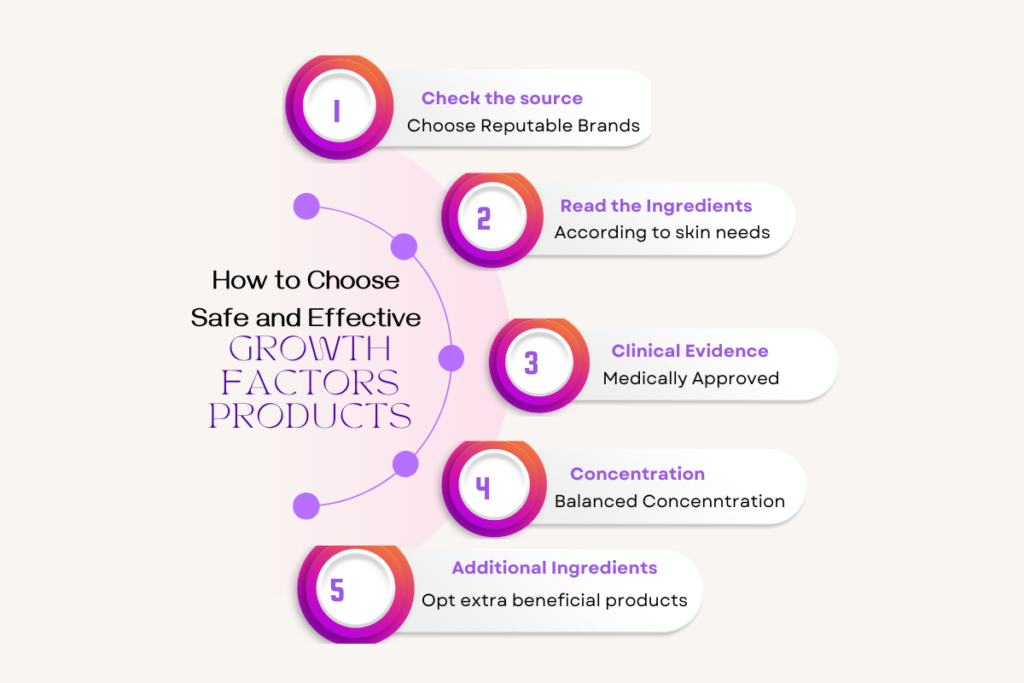
Tips for Incorporating Growth Factors into a Skin Care Routine:
You should know how to apply these products to get the desired results. Here’s a are few practices to use them in the best way:
- Start Slow: If you’re new to growth factor products, begin with a lower concentration to see how your skin reacts. Gradually increase quantity as your skin adapts.
- Apply on Clean Skin: For maximum absorption, apply growth factor products on clean, dry skin. This ensures the active ingredients penetrate effectively.
- Layer Correctly: Apply growth factor serums before heavier creams and oils. This layering technique helps the serum penetrate deeply without interference from thicker products.
- Combine with Complementary Products: Use growth factors alongside anti-ageing products like retinoids and vitamin C for more effective results.
Note: While skin care growth factors are usually safe, if you experience any redness or irritation, especially on sensitive skin, reduce the frequency of use or switch to a lower concentration.
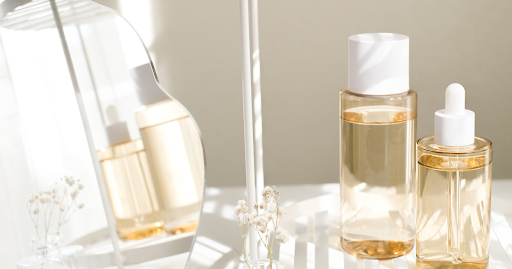
The Bottom Line
Growth factors are naturally present in our body and play a crucial role in skin repair. However, you will find several skincare products on the market with growth factors. So, most of the people get confused weather growth factors in skincare cause cancer or not.
Yet, there’s no evidence that these growth factors can cause cancer. But, you should choose skincare products that can suit best on your skin for effective results.
These products can help you remove wrinkles and avoid anti-ageing effects on your skin. However, if you have any allergic reaction, reduce the frequency and change the concentration.
Which type of growth factors do your prefer for your skin? Share in the comment section or Contact Us here.
FAQs
What do growth factors do?
Growth factors are like tiny messengers in your skin. They tell cells to do essential functions like healing. They also help to speed up collagen production. As a result, it keeps your skin firm and smooth.
Are peptides growth factors?
Peptides and growth factors are different in their function. Peptides are chains of amino acids that can signal skin cells to perform specific functions. Growth factors are larger proteins that send signals to cells but are diverse in their functions.
What are growth factors examples?
The Epidermal Growth Factor (EGF) is a growth factor. It helps with skin cell regeneration. The Fibroblast Growth Factor (FGF) helps speed up collagen production. Another is Platelet-Derived Growth Factor (PDGF), which plays a role in wound healing.
Are growth factors safe in skin care?
Yes, growth factors are generally safe in skincare. They are large molecules that don’t penetrate deeply into the skin. In that way, it reduces the risk of adverse effects.
What is the best growth factor for the skin?
The “best” growth factor for your skin can depend on your specific needs. Yet, the Epidermal Growth Factor (EGF) is one of the best choices. EGF is great for promoting cell turnover and improving skin texture. If you want to increase collagen production, Fibroblast Growth Factor (FGF) is another excellent choice.
Further Studies:
What Is Skin Care With Growth Factors?
Are growth factors safe in cosmetics?
What are Growth Factors, and are they Beneficial?

